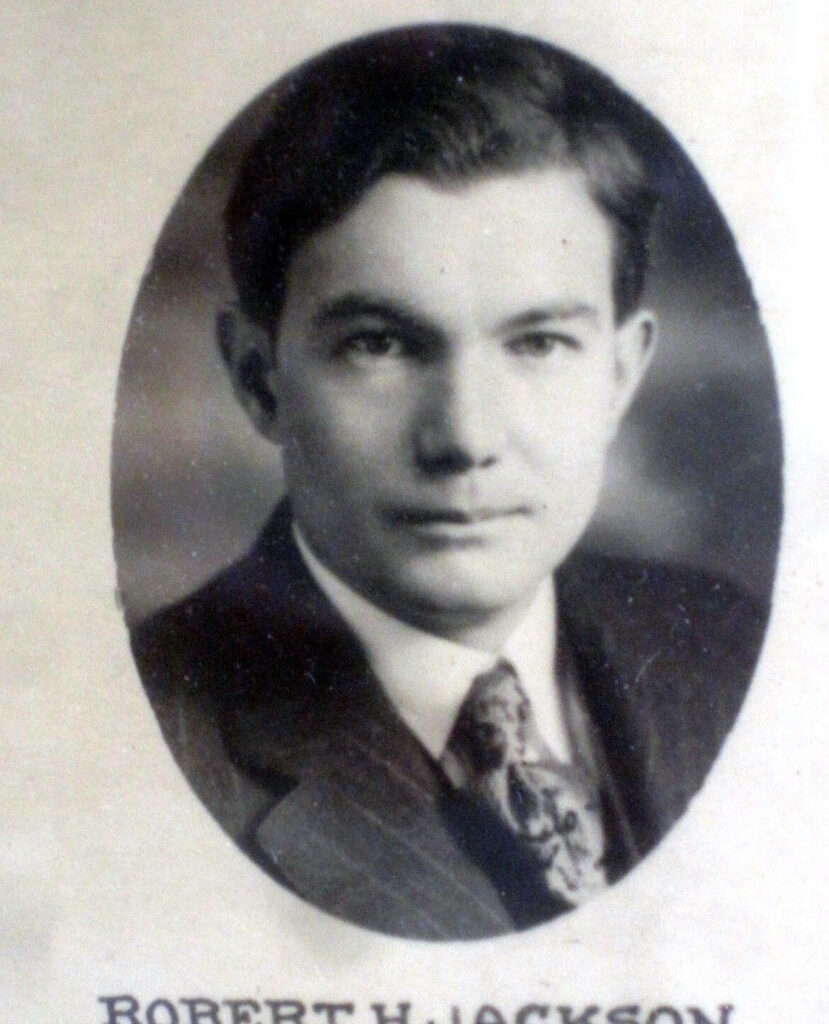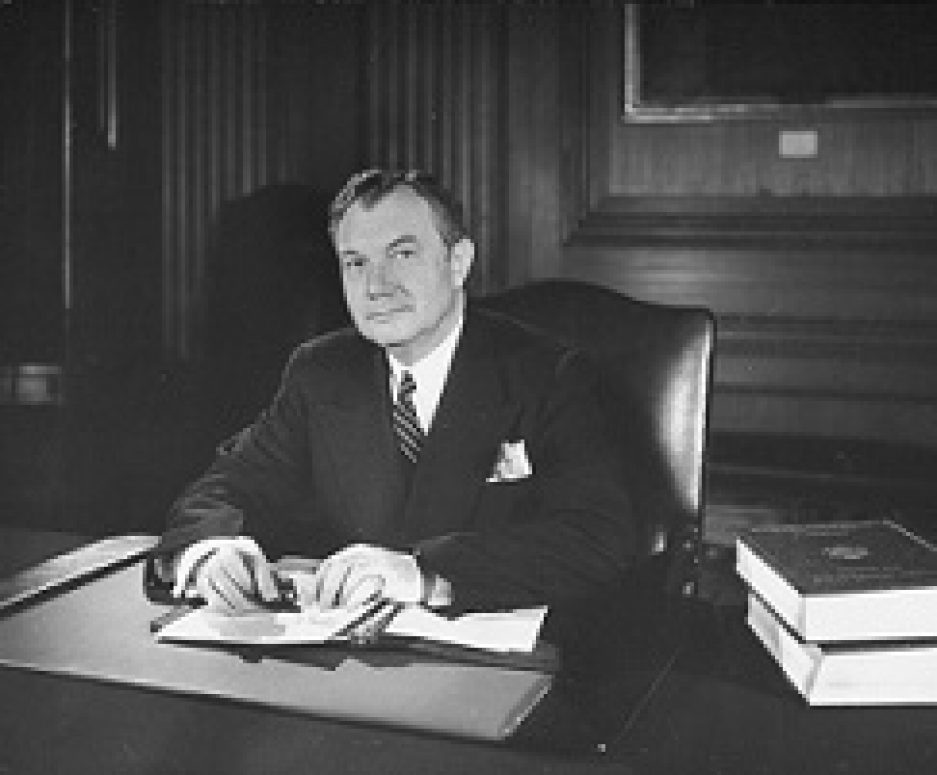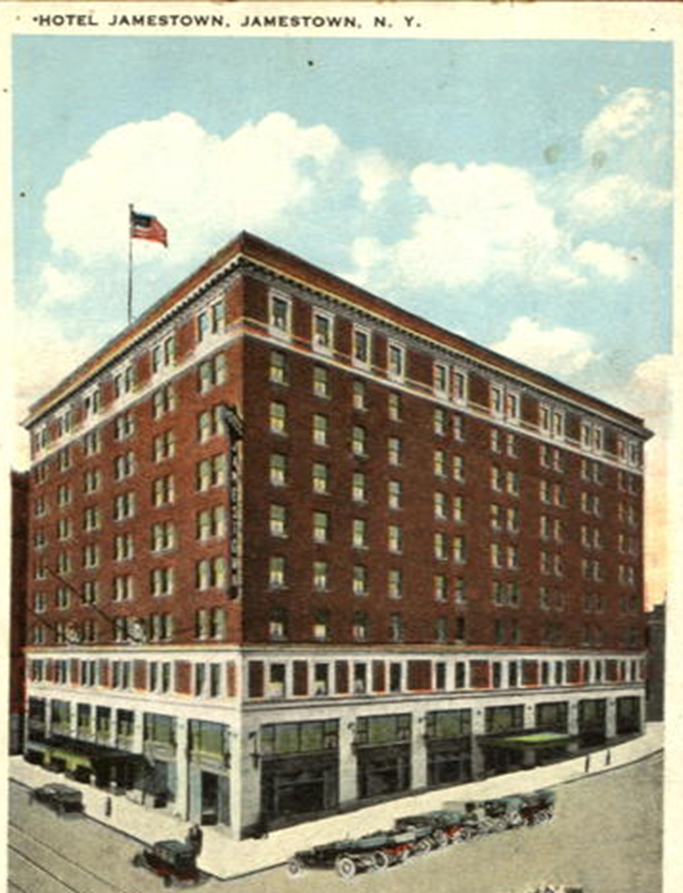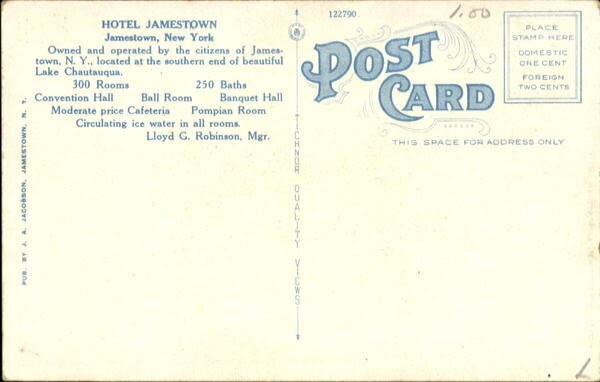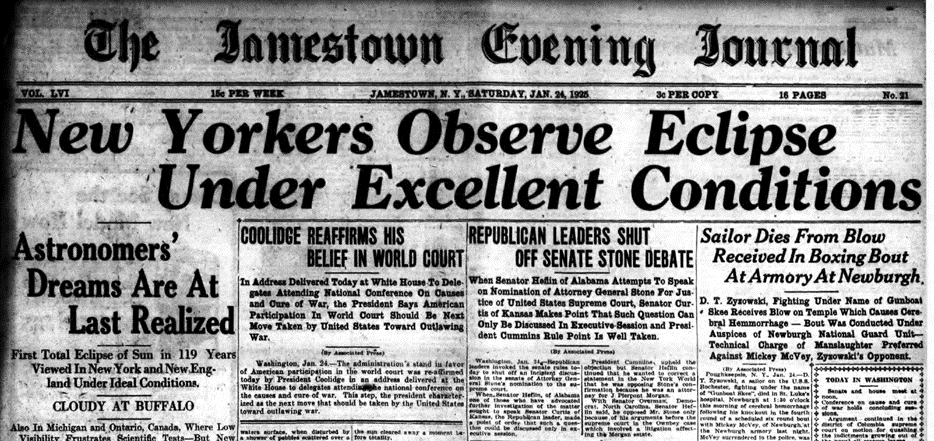On next Monday afternoon, Jamestown, New York, located south of Buffalo, will be in the path of the total solar eclipse.
This has happened before. On Saturday, January 24, 1925, Jamestown also was in the path of a solar eclipse.
At that time, Robert H. Jackson was thirty-two years old and nine years a lawyer. His law firm office was in downtown Jamestown. He lived just outside the city limits with his wife and their two children. Like most people, Jackson knew in advance that the eclipse was coming.
As that January 1925 weekend began, Jamestown’s big event was a downtown dinner. On Friday evening, January 23, almost 600 people gathered in the ballroom of the new $1.5 million Hotel Jamestown, for a testimonial dinner honoring the businessmen who had built the hotel.
Robert Jackson was one of the six speakers at this dinner. His remarks, not brief, paid tribute to the hotel builders and to rising Jamestown:
In honoring the men who have made the Hotel Jamestown possible, I have no trumpet of my own to sound. I am not a member of your Chamber of Commerce, not a stockholder of your Hotel, not even a citizen of your city.
…
I hope and believe it is Jamestown’s destiny to become an increasingly wholesome and prosperous city, a city where business is sound, institutions progressive, labor satisfied and home-owning, recreation clean and democratic, and life attractive.
…
Our day-to-day labor, the high standard of the products we send out, the way we stand up and meet our obligations, the way we live our daily lives will all set the standard of our future success. There is no other law than that we shall reap as we sow.
Commercialized hospitality has become an essential of modern society. Man is becoming increasingly nomadic. As the means of travel multiply so must the means for making the wandering tribes comfortable, when they are not speeding. Thus the hotel plays an increasing part in social and business life.
…
Because this hotel makes for the sound advancement of Jamestown, it makes it a better place to live, a more attractive town to come to. Our community unites in honoring the builders tonight.
The many, whether directors, executive committees or officers who have rendered notable service to the work, I shall pass by, leaving their virtue to be its own reward, and speak of the dominant factor in this enterprise—Frank O. Anderson.
One of the best services that the board of directors performed was to elect Frank O. Anderson president—and then adjourn. He has done the work and taken the cussing and his is the praise.
I am not here to pronounce a funeral eulogy on Mr. Anderson. He is not a willing corpse. He is alive and alert and young in spirit and will. I hope he will start and finish many another fight. He will in the future as in the past win ardent followers and stir up bitter antagonists and I want to reserve my right to be in either camp.
…
Frank O. Anderson may be said to stand in a somewhat symbolic relation to this city and day. He symbolizes the power of individualism, the success of self-reliance, the driving power of hard work guided by native ability. Born when the industry even in youth was virtue and before loafing until maturity was compelled by law, Frank O. Anderson was thrown upon his resources with only the intangible capital composed of ability and determination. The struggle taught him what college would not. But his own work never so overwhelmed him that he failed to see the public needs of his city. ….
Samuel A. Carlson, Jamestown’s mayor and an important Robert Jackson mentor and close friend, was another speaker at the dinner.
Mayor Carlson saluted the many builders and supporters who had brought the Hotel Jamestown into being.
Then Mayor Carlson, in the course of lauding Jamestown’s civic spirit and hoping for its intellectual progress, mentioned the coming solar eclipse as a next-day occasion on which to think about human advancement:
In conclusion, I want to express the hope that this community spirit may always be kept alive and in touch with the advanced thought of our time.
That the intellect of man is steadily broadening is evidenced by the fact that a few centuries ago an eclipse of the sun was regarded as an expression of divine wrath. Tomorrow, if we are favored with a clear sky, millions will witness this wonderful phenomenon without fear and with perfect calmness, knowing that it is only a natural movement of planetary bodies surrounding the terrestrial globe on which we have providentially been placed. Men have come to a better understanding of their true relation to each other and to their Creator. Investigation and research by scientists and thinkers has annihilated most of the old superstitions and old theories that once dominated the world.
And let us remember that it is just in proportion to the degree of tolerance with which we accept new thought, new discoveries, new inventions, and new movements, that our advance towards the better, higher, and nobler things is made.
The solar eclipse indeed occurred the next morning, on Saturday, January 24, 1925. The skies were clear in the Jamestown area, so people saw the eclipse and marveled.
I have not located any evidence that Robert Jackson saw the eclipse. My guess is that he did, because it was such a significant and visible event.
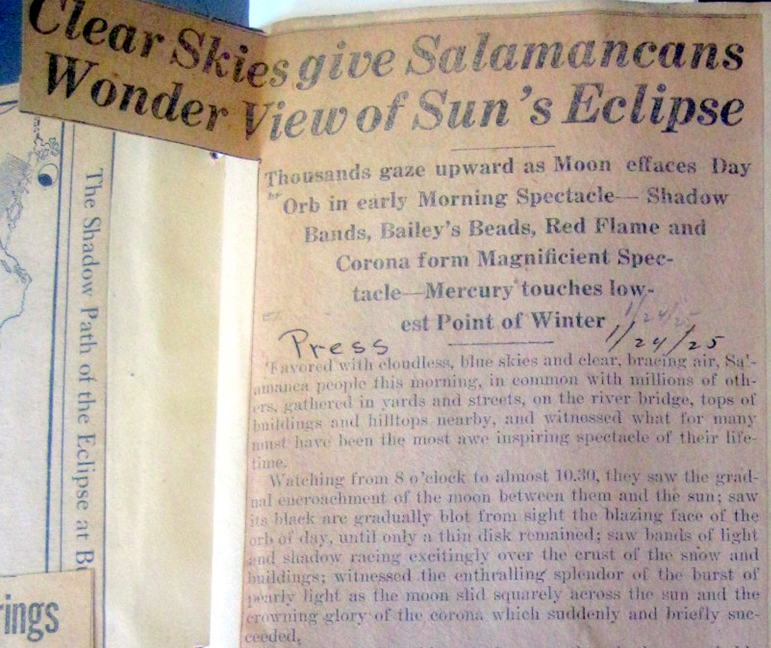
I do know that Jackson sometimes thought and spoke in astronomical terms. One of his most eloquent and famous U.S. Supreme Court opinion lines, for example, is this summation in his 1943 opinion for the Court in West Virginia State Board of Education v. Barnette, which held unconstitutional a state requirement that public school students recite the Pledge of Allegiance and salute the U.S. flag:
If there is any fixed star in our constitutional constellation, it is that no official, high or petty, can prescribe what shall be orthodox in politics, nationalism, religion, or other matters of opinion or force citizens to confess by word or act their faith therein. If there are any circumstances which permit an exception, they do not now occur to us.
Robert Jackson did not pen all of those words—those upward-gazing words—for the first time at the Supreme Court in 1943. He wrote some of them eleven years earlier, in Jamestown.
In 1932, Jamestown lawyer Jackson wrote about Milton Fletcher, his 1909-1910 Jamestown High School principal, teacher, and mentor. Fletcher, who after Jackson’s student days had become Jamestown’s school superintendent, had retired. Jackson began his Mr. Fletcher tribute remarks as follows:
Before Mr. Fletcher a procession of generations has marched. Each year a new group went forth from the high school, moving on to the adventure of life. He was there before they came—he stayed when they were gone. We students came to think of him as permanent and ourselves as transients: we were the great parade; he from the reviewing stand saw us pass. We were the moving satellites, the erratic comets—he the fixed star. So it came as a shock to read of his resignation, to learn that the fixed star also moves.
And so I wish you clear views:
- of the April 8, 2024, solar eclipse, if you are in its path;
- of Barnette, soon to be eighty-one years old, a landmark explication of the U.S. Constitution’s protections of conscience; and
- of community, and the roles that many can play, singly and together, in building it, physically, intellectually, and even astronomically.
